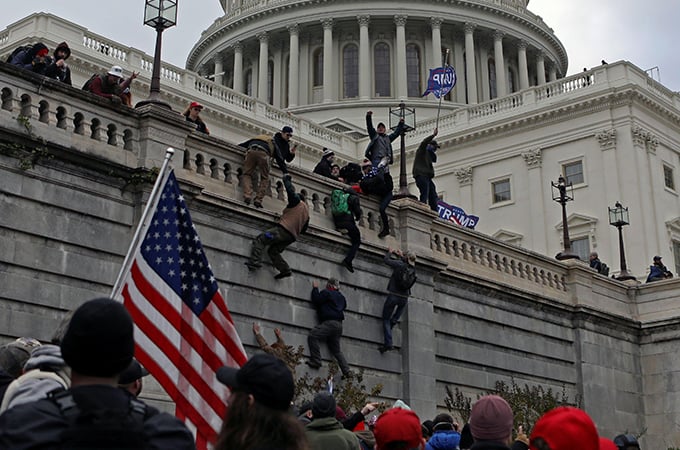On Jan. 6, hundreds of supporters of President Donald Trump stormed the U.S. Capitol Building to interrupt the certification of President-elect Joe Biden’s Electoral College victory. It was the most unprecedented of all the events that occurred during the controversy-filled Trump administration. Like many citizens around the country, members of the University of Redlands community craved answers.
“Watching any political news unfolding is inextricably tied to my vocation as a political theorist,” said U of R Professor of Political Science Althea Sircar. “As significant political phenomena unfold, I immediately begin to think of how I’d approach discussing a situation like [the insurrection at the Capitol] in class.”
So Sircar and Professor Renée Van Vechten rallied their colleagues to host an impromptu online conversation. Alongside Professor Eric McLaughlin and Interim College of Arts and Sciences Dean Steve Wuhs, they provided a way for the Bulldog community to discuss, learn, and process what Van Vechten called “a disastrous day for the U.S.”
“We wanted to do an event quickly to provide immediate support,” Sircar said, so 24 hours after the insurrection, more than 50 faculty members, students, alumni, and community members were taking part in the two-hour discussion about the events’ constitutional issues, electoral implication, and political and social ramifications.
Also present were a number of faculty members who provided cross-disciplinary insight, including Professor of Race and Ethnic Studies Jen Tilton, and Professors of History Kathy Feeley, Jessie Hewitt, and Matt Raffety. Attendees asked questions that ranged from legal specifics (such as a question from Gabriel Rodriguez ’22, “Why is it important to impeach Donald Trump again?”) to historical precedents and the status of the United States as a nation-state (“What does it mean for the concept of justice in this country if Trump isn’t charged?” asked Keith Dawson’ 22).
Among the audience members was Mayor Pro Tem for the City of Redlands Denise Davis ‘06, who commented to the Bulldog Blog, “I was proud to see U of R faculty respond quickly to such a significant national crisis.” She added, “It was a thoughtful and engaging conversation, acknowledging the present and historic danger of white supremacy in this country.”
Attendees also became emotional when sharing personal experiences. Coming amid a prolonged season of great suffering and anxiety, Sircar noted the violent Capitol event is particularly jarring for many. “I was heartened by the deep hunger so many of us have to converse together and learn from one another’s insights,” she said. Providing historical, philosophical, and legal knowledge is one way to help the Bulldog community find understanding. “We must keep listening to and talking to one another, informally as well as in classrooms and meetings.”
Van Vechten added, “We barely quenched our thirst for answers about the causes and consequences of that shameful event—an episode that reaffirms our collective commitment to the democratic experiment and cultivating critical thought among all those who participate in it.”
The conversation about events in the Capitol took place outside the virtual gathering as well. U of R President Ralph W. Kuncl sent a statement to the University community denouncing the insurgency. And students formed their own perspectives and takeaways.
“What happened on Wednesday is a disgrace to democracy, to the rule of law, and America,” said Trueman Andrews-Gibson ’21, editor-in-chief of the Redlands Bulldog. “There is no place in our political system for rejecting popular government or threatening lawmakers. As students and Americans, we’re obligated to restore civility to our national discourse.”
Emiliano Arizmendi ’22 added, “This day is a turning point in United States history, one that made us realize that our democracy is fragile. If we feed the flames of misinformation, ignorance, and mistrust, our division will only lacerate the very fabric of our American society. I think this violent act of insurrection is a warning, a little window into the future if we don’t come together as a nation as Americans.”
Learn more about studying political science, history, or race and ethnic studies at the University of Redlands.






